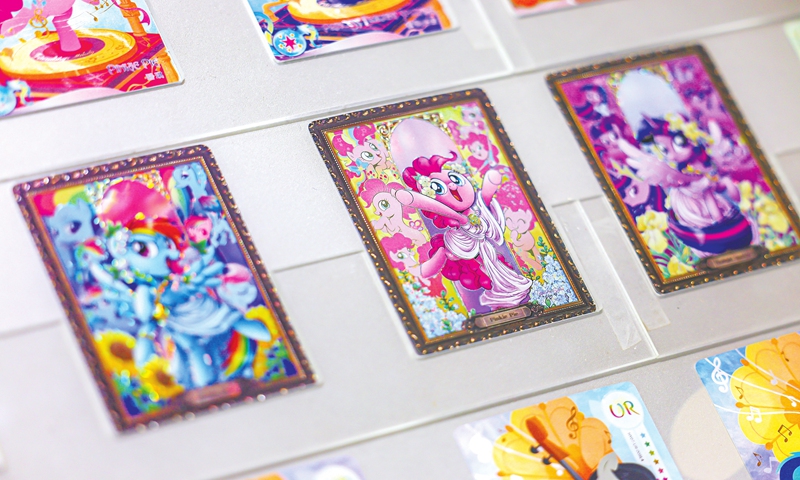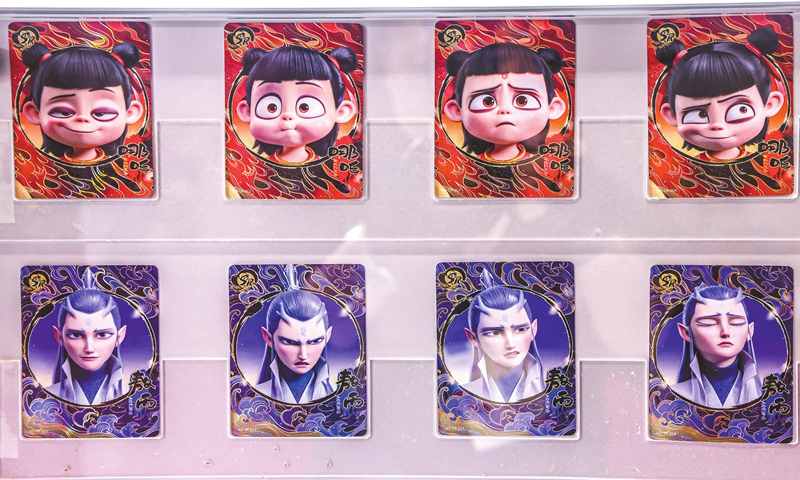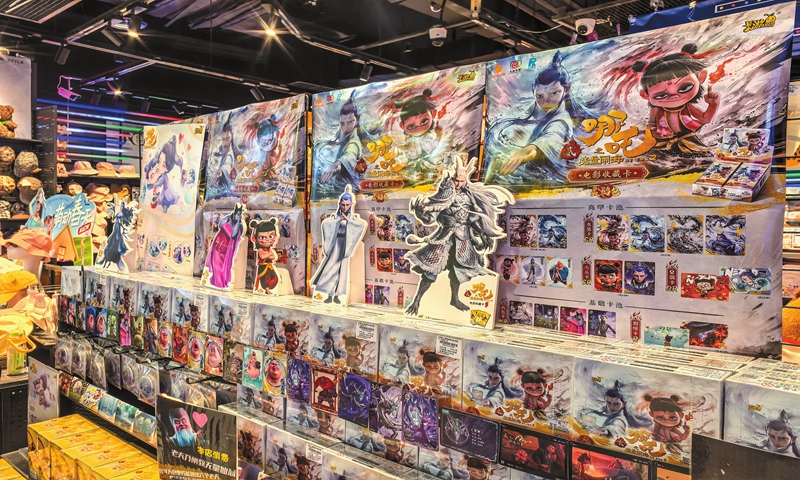On a recent weekend evening at a toy store in Beijing's Wanda Plaza, a group of schoolchildren huddled around a card display, pointing excitedly at packs on the shelf and comparing their latest pulls. "This one is a gold-foil limited edition
- with the shark monster from the movie!" one said. "Mine is the newest hot-stamped
!" another chimed. Clutching their shimmering cards, their eyes sparkled with excitement and pride.
cards cost as little as 2 yuan ($0.27) per pack. His parents reward him with one pack whenever he does a great job on his homework. "I've already bought about 50 packs," he said happily, adding that pulling rare cards and sharing them with classmates has become a source of motivation for going to school.
To children, it's a fierce card battle of bragging rights. Yet behind these small, shiny cards lies a quietly booming new form of consumption - one driven by emotional value. Industry analysts describe this trend as "emotional consumption." The China Consumers Association reports that a growing number of young consumers view "mood enhancement" as a crucial factor in their purchasing decisions, according to Xinhua.
The growing popularity of trading cards is a reflection of the broader boom in "emotional consumption."

My Little Pony collectible cards Photo: courtesy of Kayou
Surging sales
From
My Little Pony, a longtime favorite among trendy young girls, to
Nezha, a rising icon in China's homegrown animation boom of 2025, two seemingly different card collections share the same origin: Zhejiang Kayou Animation Co, a Chinese company founded in 2011. Now the country's leading trading card producer, Kayou reported revenue of around 10 billion yuan ($1.37 billion) in 2024.
This shows that once a niche hobby, trading cards are quickly turning into a massive new consumption phenomenon.
The scale of China's trading card market stood at 12.2 billion yuan in 2022, and is forecast to hit 31 billion yuan by 2027, according to a report from Dongguan Securities released at the end of 2024. The collectible card segment could surge to 27.66 billion yuan by 2025 from 11.31 billion yuan in 2022, the report said.
Beyond Kayou, other Chinese companies are also thriving in the growing card industry, each with unique strengths.
For example, Alpha Group Co is developing card products based on local youth TV franchises such as
Pleasant Goat and Big Big Wolf and
Balala the Fairies, according to the report from Dongguan Securities.
Shanghai Yaoji Technology Co is also investing heavily in the trading card industry, after becoming a licensed agent for the Pokémon Trading Card Game (TCG) and a stakeholder of Daka, which has become the country's first specialized sports card publisher, while releasing products across football, basketball, and esports, according to the report.
Behind the growing popularity of cards is young consumers' emphasis on low-cost, high-emotional value goods based around a particular franchise or story, referred to as "IP," which stands for "intellectual property."

Nezha 2 movie-themed collectible cards Photo: courtesy of Kayou
Emotional value"China's consumption market constantly evolves, and in some areas, emotional value increasingly dictates market trends. Consumers who prioritize emotional value tend to purchase more and feel more satisfied, while brands that cater to this trend can drive stronger sales," Zhang Yi, CEO of the iiMedia Research Institute, told the Global Times on Monday.
Highlighting this trend, a survey from McKinsey shows that 64 percent of Chinese consumers attach more importance to emotional consumption, and this is evident among young consumers in particular, according to Xinhua.
Meanwhile, strong IPs significantly influence teenagers, as cards linked to popular films, animation, or games tend to match their interests, aesthetics, and social habits, Zhang said, adding that China's early IP market largely relied on imported licenses, but domestic IPs have rapidly gained ground in recent years. Industries such as animation and gaming now have a deep reserve of homegrown IPs, with many game franchises building strong influence over time, he noted.
The rise of animated film Ne Zha and its IP offers a prime example. Within the first month of launch, Kayou's
Nezha 2 series sold over one million boxes in online presales, while offline stores went through repeated restocking and instant sellouts. And some rare cards have fetched prices over 20 times their original cost on secondhand platforms, a Kayou representative told the Global Times.
While
Nezha appeals mostly to younger boys, many teen girls gravitate toward
My Little Pony.
"
My Little Pony cards have been popular for longer, and they're more delicate and better-looking than others," a 15-year-old student in Shanghai surnamed Wu told the Global Times. Her mother added that she's happy to take Wu to occasional
My Little Pony pop-up events - like the one held at Shanghai Joy City in late 2024 - and buy a few beautifully designed cards. "It's an affordable way to meet her emotional needs," Wu's mother said.
Zhang told the Global Times the appeal of trading cards lies largely in their interactive gameplay. "The ability to collect, trade, and build custom decks gives young players a sense of accomplishment and fun," he noted. "It sparks curiosity and delivers strong emotional value - cards have essentially become a form of emotional currency among children."
Going forward, the card industry's future lies in brand-building and cultural depth, Zhang said. "Developing strong IPs with unique cultural value will be key. At the same time, digitalization - driven by technologies - will enhance the authenticity, rarity, and design of collectible cards, opening up new possibilities for creation and distribution," he said.
As the trading card market thrives, some have also raised concerns. Some parents have complained that the price of a box of cards, at about 180 yuan, is not particularly cheap, considering only one to three rare cards per box may be cherished by their children, while the rest of the cards are often discarded as trash.
While providing emotional value, these cards also offer children a thrill similar to that from opening a blind box, and have even been criticized by some parents as akin to gambling. "We need to prevent children from becoming overly addicted," a parent surnamed Liu told the Global Times on Monday.
Li Chang'an, a professor at the Academy of China Open Economy Studies at the University of International Business and Economics, also told the Global Times that excessive obsession with trading cards could have adverse effects, as some children become overly focused on obtaining rare cards, leading to emotional distress and behaviors that resemble gambling.
Amid concerns from some parents, Li called on relevant companies to fulfill their social responsibility and take concrete efforts to encourage rational purchases, especially when targeting young consumers.






